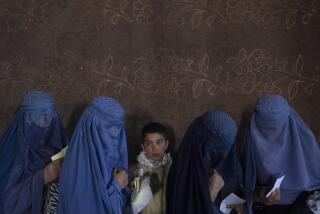Raw Deal
- Share via
Women hold up half the sky, as the saying goes, but here on Earth they get a lousy deal. That’s the only conclusion to be drawn from a new study by the Washington-based Population Crisis Committee that documents the grinding poverty and blatant discrimination endured by three-fifths of the world’s women. In the Third World, girls are more likely than boys to die before their fifth birthdays, more likely to be denied an education and health care and adequate nutrition, more likely to grow up illiterate. In countries like Nigeria, Afghanistan and Bangladesh, the study shows, young women are still forced into early marriages that too often end with death in childbirth. In conservative Islamic countries, women are not even considered autonomous individuals in the legal sense.
Many of these findings may seem remote to Americans; women here, despite their legitimate complaints about inequities and indignities on the job, lead privileged lives compared to their counterparts abroad. Fifty-nine percent of college students in the United States are female; no other country in the world comes close to providing the same educational opportunities.
Yet there are striking similarities between the lives of American women and those of their foreign sisters. The study found, for example, that the feminization of poverty is universal, that in almost every nation households headed by women are the most destitute. Everywhere full-time women workers earn less than men do, largely because women are concentrated in “pink ghettos.” The nature of the ghettos varies, however--secretarial work and nursing in the United States, cotton harvesting in Egypt, tea picking in Sri Lanka, electronics assembly in Mexico. And in both developed and developing countries women find their free time severely limited because of the double demands on them; millions work full time, then go home and shoulder most of the domestic chores.
The study shied away from sweeping recommendations but noted that one universal key to improving the status of women is ensuring them safer childbirth and unrestricted access to effective contraceptives. Without some control over their reproductive cycles and the size of their families, women cannot hope to complete their educations, provide for their children or exercise the political rights that they are slowly winning. That finding is particularly instructive for the United States, where political zealots sometimes have tried to withhold foreign aid from organizations and governments promoting contraception and abortion rights.
More to Read
Sign up for Essential California
The most important California stories and recommendations in your inbox every morning.
You may occasionally receive promotional content from the Los Angeles Times.













